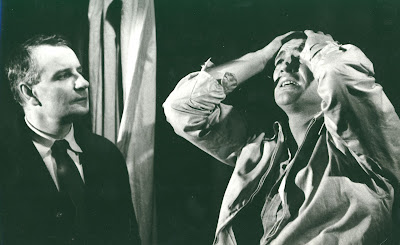Here's an exert from the article by Frank Keating. The original article can be read here
"By nice coincidence, this modest commemorative hurrah to mark the half-century since the publication of the finest British novel about professional sport to be written by an actual professional sportsman coincides with yesterday's naming of Brian Moore as 2010's winner of the William Hill prize for sports book of the year.
In the 50 years since its first appearance in 60s' pre-Christmas bookshops, David Storey's This Sporting Life remains not only the best literary novel by a sportsman, but the only one...
This Sporting Life has stood the test of "classic" category; at the time the Guardian staffer and rugby league buff Geoffrey Moorhouse hailed the novel as "unique", adding that "an interest in rugby league is by no means necessary to appreciate this story, any more than a fascination with whaling has ever been vital to an enjoyment of Moby Dick"...
Indeed, only this very year, the novelist Caryl Phillips was acclaiming Storey in our books' pages as "the only author who knew what it was like to be raked and stamped on by opponents, and then patronised by the chairman over drinks in the boardroom, so only he could have written such a fiercely authentic account of the hypocrisies of British sporting life"...
The novel's uneasy love story of insecure anti-hero tough, Machin, and his world-weary landlady, Mrs Howard, earthily provides harrowing off-field narrative, but it is in the raw sporting passages where the reader can wince at the resonance of uncomfortable truths as in, to take a single example, this touchline gallop by the malcontent, joyless Machin...
In Robert Sellers's unputdownable new book Hellraisers, on the careers of various larger-than-life actors, the author quotes Storey on the first day's shooting of the film at Huddersfield's ground where the cynical local team, hired as extras, waited in a bored, heel-kicking cluster for Harris's entrance.
"They were at the other end of the pitch going, 'Oh, Jesus, look at this flower coming out.' Harris just took one look at them and ran down the whole pitch towards them. And as he ran, he got faster and faster until they suddenly realised with horror that he was going to run right into them, which he eventually did. It was that initial gesture of total physical commitment, indifference and carelessness, that caught the players' admiration and they really took to him in a major way."
For once a film was so faithful to its origins that it even enhanced the original novel's unfading and stimulating quality. Sports book of the half-century, you might even say."
The novel was first published in 1960 and the film, made by Lindsay Anderson, and starring Richard Harris, was made in 1963.
 |
| Lindsay Anderson and Richard Harris on set of This Sporting Life © Lindsay Anderson Collection, University of Stirling Archives |


No comments:
Post a Comment